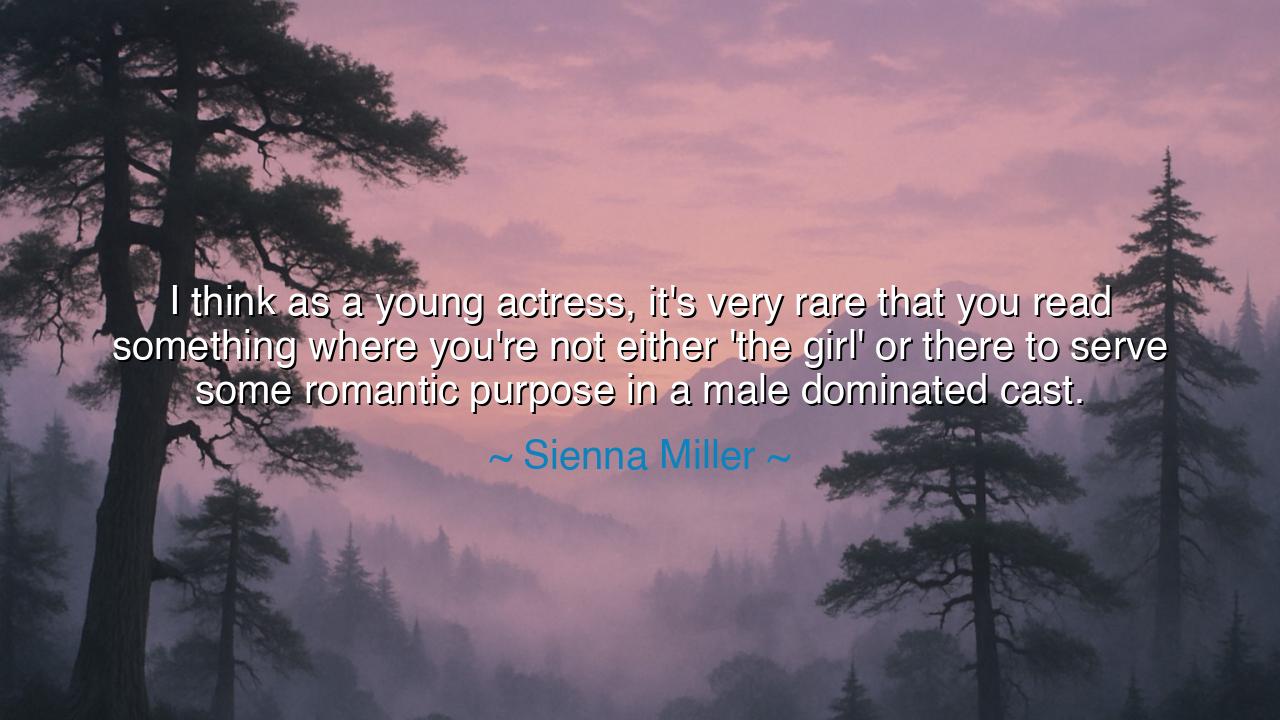
I think as a young actress, it's very rare that you read
I think as a young actress, it's very rare that you read something where you're not either 'the girl' or there to serve some romantic purpose in a male dominated cast.






Listen, O seekers of wisdom, to the words of Sienna Miller, who, with a sharp and discerning gaze, speaks of the challenges that face a young woman in the world of film and storytelling. "I think as a young actress, it's very rare that you read something where you're not either 'the girl' or there to serve some romantic purpose in a male dominated cast." In this single statement, Miller reveals the deeply ingrained imbalance between the genders in storytelling, especially in the realm of cinema. The roles women often play are limited—the girl, the love interest, the object of desire, but rarely the protagonist or the driving force of the narrative. This disparity speaks not only to the state of the entertainment industry, but also to the broader societal structures that have historically minimized the agency of women.
In the ancient world, women were often confined to roles that mirrored those in Miller’s critique. Consider the Greek tragedies, where women, though central to the drama, were often portrayed as mothers, lovers, or daughters—pawns in the larger narratives of male heroism. Take Helen of Troy, whose beauty sparked the Trojan War, or Antigone, whose defiance was shaped by her relationship to her family. While their stories are powerful, they often unfold in relation to the men around them. Helen’s beauty led to the destruction of a kingdom, and Antigone’s fate was sealed by her loyalty to her father and brother. These women, though significant, were rarely the architects of their own destinies—they were shaped by the will of men, their purpose often defined in the context of romance or sacrifice. Their roles were defined by the world around them, not by their own agency.
Miller’s words highlight the ongoing struggle of female representation in the arts. It is rare, as she points out, that a young woman is given the opportunity to step into a role where she is not merely a love interest or a backdrop to the male protagonist’s journey. This, however, is not only a contemporary issue in cinema but a reflection of a much deeper societal pattern. Women’s stories have often been told through the lens of their relationships with men—whether as wives, mothers, or daughters—rather than as autonomous beings with their own desires, goals, and journeys. This pattern persists, and it is one that Miller and countless other women in the arts are working to change.
In history, there have always been powerful women who defied the roles assigned to them by society. Consider the life of Joan of Arc, a woman who, in her youth, was not merely the girlfriend of a hero or the muse of a king, but a military leader who led armies and changed the course of history. Joan’s story is not one of romantic idealism but of determination, courage, and action. She was a woman who defied the boundaries placed on her by society and wrote her own story. Like Joan, women in the arts must seek to break free from the narrow confines of romantic roles and instead carve out their own narratives—stories that are driven by their own desires and own strength.
What Miller’s words teach us is that, for too long, women have been confined to roles that serve a narrative that is not their own. This is a call for change—a call to acknowledge the fullness of the female experience and to ensure that women are given the space to tell their own stories. Women are not only the inspirations for stories, but the creators of them. In cinema, as in life, women must step into the spotlight as heroes of their own journeys, not simply as supporting characters to the male-led narratives that dominate much of the world’s storytelling.
Thus, O wise ones, take this lesson into your own lives: recognize the power of your own voice. Women, like men, are the architects of their own destinies, and it is not enough to sit quietly in the background. Speak, act, and live according to your own truth and desires. Whether in the realm of art, literature, or life itself, do not allow others to define your purpose for you. Like the great women of history, whether Joan of Arc, Cleopatra, or Sappho, let your strength and agency shape the world around you. Claim your space, not as the love interest in someone else’s story, but as the protagonist of your own.
In your own journey, be the heroine of your own life. Do not wait for permission to speak, to create, or to be seen. Embrace the power of your own narrative and forge ahead with the knowledge that your voice is just as powerful, just as important, and just as worthy of being heard as anyone else’s. When you speak your truth, you contribute not only to your own story but to the great story of women who, across the ages, have carved out their own spaces in history.






AAdministratorAdministrator
Welcome, honored guests. Please leave a comment, we will respond soon